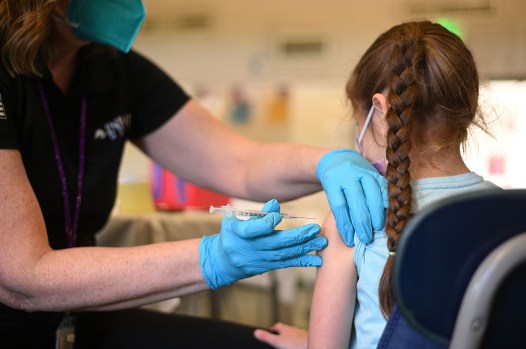Residents of Colorado aged six months and older can now receive updated COVID-19 vaccinations, although coverage by insurance remains uncertain. Initially, pharmacies in Colorado were unable to administer these updated shots unless a patient had a prescription. To address this issue, Dr. Ned Calonge, the chief medical officer for the Colorado Department of Health, issued a standing order that allows all residents to obtain vaccinations at retail pharmacies without needing individual prescriptions.
Despite this increased accessibility, the standing order does not guarantee that insurance companies will cover the costs or that pharmacies will stock the vaccines. In 2022, less than half of individuals over 65 nationwide received an updated COVID-19 vaccination, with lower uptake rates among younger groups. Dr. Calonge emphasized that while the standing order enhances accessibility, it does not ensure availability, stating, “It provides accessibility. It doesn’t necessarily provide availability.”
Insurance Coverage Variability
Last week, the Colorado Division of Insurance proposed a draft rule that would require state-regulated health plans to cover COVID-19 vaccines without out-of-pocket costs for individuals of all ages. If passed, this rule would only apply to state-regulated plans, which typically display “CO-DOI” in the lower left corner of the insurance card. Approximately 30% of employer-sponsored plans in Colorado are federally regulated and would not be affected by this proposed regulation.
Dr. Calonge noted that federally regulated plans usually aim to offer competitive benefits since they primarily serve larger employers. “My hope would be they would want to keep up with other insurers,” he said. This situation is not unprecedented; previously, Colorado implemented cost caps on insulin and epinephrine shots for state-regulated plans but could not extend these measures to federally regulated plans.
Responses from insurers vary. Select Health, which offers Medicare and individual marketplace plans in Colorado, confirmed that its plans currently cover COVID-19 vaccines without any out-of-pocket costs. Kaiser Permanente Colorado also announced that it will cover the vaccine for anyone aged six months or older. In contrast, Donna Lynne, CEO of Denver Health, expressed that her organization is awaiting clarification regarding coverage policies for its various plans, which include both state-regulated and federally regulated options.
Anthem has stated that it considers immunizations recommended by recognized bodies, such as the American Academy of Pediatrics and the CDC, as “medically necessary.” However, the company did not clarify whether it would impose out-of-pocket costs for these vaccines.
Future Recommendations and Challenges
The Colorado Medicaid program is currently awaiting federal guidance on vaccine coverage, while Medicare has not yet begun covering the updated shots. Historically, COVID-19 vaccines were provided free of charge to all individuals aged six months and older. However, in 2024, the federal government discontinued funding for them, leaving uninsured individuals uncertain about accessing the shots without incurring costs.
Most insurance plans were still required to cover the vaccines due to recommendations from the CDC’s Advisory Committee on Immunization Practices. The committee typically issued recommendations promptly following FDA approvals. Recently, the FDA approved updated vaccines for those over 65 and individuals with specific medical conditions, including asthma and diabetes.
In 2023, the committee’s meeting schedule changed, and it may not recommend the vaccines in upcoming discussions. The Secretary of Health and Human Services, Robert F. Kennedy Jr., dismissed the previous committee members and appointed new individuals, many of whom have expressed opposition to COVID-19 vaccines. The committee’s future recommendations will significantly impact whether the Vaccines for Children program can provide vaccinations for uninsured children, those on Medicaid, or members of American Indian tribes.
Cathy Bradley, dean of the Colorado School of Public Health, highlighted the implications of these changes, noting that the initial assumption of the committee as an impartial authority on vaccination recommendations is now in question. As Colorado navigates this evolving landscape, ensuring access to vaccines remains a priority. Bradley emphasized that allowing anyone who wants a COVID-19 vaccine to receive it from their chosen provider is a crucial first step, as the vaccines continue to be effective in preventing severe illness.
As the situation develops, Colorado may need to explore additional solutions to maintain access to COVID-19 vaccines for its residents.





































































